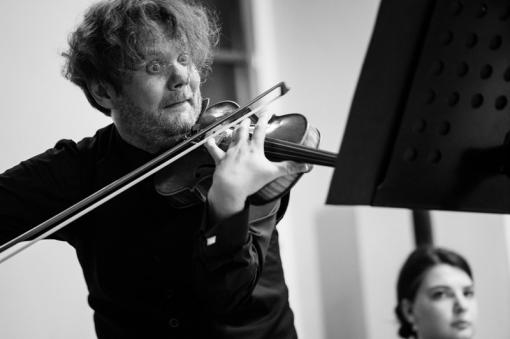The Brno Contemporary Orchestra, conducted by Pavel Šnajdr, concluded its ninth season with a concert called Con certo: With Certainty or with the Devil?, held in the hall of the Convent of the Merciful Brethren. The programme featured works by authors already established in the world of contemporary classical music: Alexej Fried, Olga Neuwirth and György Ligeti, whose violin concerto was performed by the violin virtuoso Milan Paľa.
In recent months, the Brno Contemporary Orchestra has contributed two virtual broadcasts to the virtual space, in addition to recordings of its past concerts (Nová Má vlast, Koncert pro děti 18+ [New My Country, Concert for Kids 18+]): the compositions created were "tailored" by the composers to the quarantine experience and were broadcast by the orchestra live from the rooms of Orlí Theatre. Recently, listeners at the Prague Spring could watch a concert, originally intended for Prague's DOX, from the lobby of the Janáček Theatre in Brno. With its first live concert after lockdown, the orchestra ended its bold and burdensome ninth season, entitled Ninth Wave, during which it played in the Brno crematorium, in the House of the Lords of Kunštát and in the Sono Centrum, and also gave a concert in a concert hall.
The concert was opened by Kasace pro komorní orchestr (Cassation for Chamber Orchestra) from 1985 written by the Brno native Alexej Fried, who is known for combining classical music, popular genres and jazz. At the beginning of the programme this was a refreshing shower of loose form, emotional but well-readable expression and flashy dissonant tonal clusters. The composition, which was energetic and captivating with its contrasts and a technique not quite well-established for classical music, was a very suitable choice for the introduction. The author conceived of the instrumental groups of strings, winds and percussion in a relatively independent manner. They all gave an excellent performance with vibrant expression. The strings and wind instruments had their tone firmly in their hands, even in the quietest passages. The precise interplay of the entire chamber orchestra then stood out in the shocking dynamic waves. The Brno Contemporary Orchestra went into the performance truly headlong – when the percussionists blasted out with their instruments and the windows in the hall of the Convent of the Merciful Brethren started shaking, it was already obvious from the first composition that these premises are somewhat constricted for the orchestra and the compositions performed. For some people this may certainly be a positive phenomenon (which is moreover impossible to experience while watching an online broadcast) – the acoustics of the hall, however, did not soften such intense tones and noises at all, and the more aggressive ones were on the verge of what was bearable.
A different, more dreamlike mood was introduced by the composition Un posto nell’acqua (A Place in the Water) by the Austrian composer Olga Neuwirth. Dating from 2009, it was the freshest composition of the evening, and it was also played at the orchestra's performance at Prague Spring on 20 May 2020. In the first and last minutes of the piece, the instruments almost compete with each other in being quieter, more subtle and with more tremolo, as though they wanted to keep the pressure high in the imaginary capillaries. Despite the occasional discharges of synthesisers, the composition is particularly meditative in all its motion, the individual instruments merge in colour and the tones, which are as uncertain as possible, are moved by gravity – a descending figure evoking flowing water is frequently heard here. Olga Neuwirth and the orchestra managed to evoke a feeling of stillness, unchanging duration, by constantly shaking (here again attention was lured by thin bows with harmonics, by the winds or by a carillon). In addition to an electric piano or a palette of percussion instruments, the instrumentation was made special by an electric guitar, which was very decent in its use, but more audible than at the Prague Spring version. Un posto nell’acqua proves that, just as in communication without words, prescribed relationships between tones and a transparent form are not necessarily needed for understanding.
The mightiest in its dimensions was the last composition, György Ligeti's Violin Concerto from 1983, performed by the soloist of the evening Milan Paľa. This pleasant surprise was actually foretold by the programme text, which suggested that this work was as though tailored for the soloist Milan Paľa. It wasn't wrong. The difficult five-movement piece, was full of the player's and composer's techniques, unconventional colours (unison of violin and marimba) and energy with a drop of pathos. Despite the undeniably new sound, the names of the movements refer to old musical forms such as hoquet, chorale or passacaglia. After the messy, sonic and curtly brisk first movement, the flow of music slowed in the lyrical Aria with the solo violin in a low position and a mournful melody, and Milan Paľa's forceful interpretation slightly reduced the potential contrast with the rest of the composition. The block of dense tempo and frequency intensity of the following parts was cut through by the brilliant final cadenza of the solo violin, in which Milan Paľa took over all the expressiveness, which until then had been held by the whole orchestra. Predatory, metamorphic and performed in extreme tension, it provided the desired effect of purgation and catharsis.
The Brno Contemporary Orchestra has stubbornly been true to its name again and continues to pose meaningful challenges to its audiences.
































No comment added yet..